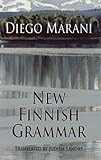| Author: |
|
Diego Marani
|
| Title: |
 |
New Finnish Grammar |
| Moochable copies: |
|
No copies available |
| Amazon suggests: |
|
| Recommended: |
|
| Topics: |
|
| Published in: |
|
English |
| Binding: |
|
Paperback |
| Pages: |
|
196 |
| Date: |
|
2011-05-11 |
| ISBN: |
|
190351794X |
| Publisher: |
|
Dedalus Ltd |
| Weight: |
|
0.44 pounds |
| Size: |
|
0.5 x 5.25 x 7.75 inches |
| Edition: |
|
Ist |
Amazon prices: |
|
|
| Previous givers: |
|
3 David (United Kingdom), Robert Wechsler (USA: CT), Belladonna1975 (USA: OK) |
| Previous moochers: |
|
3 marcus petz (Finland), spookky (Israel), spookky (Israel) |
| Wishlists: |
|
| Description: |
|
Product Description
non fiction book
|
| Reviews: |
|
Marianne (Australia) (2013/05/10):
New Finnish Grammar is the second book by Italian novelist, translator and newspaper columnist, Diego Marani, and the first to be translated into English. This is the tragic tale of a man found on a dock in Trieste during World War Two with a head injury, no memory and no language. Petri Friari, the doctor who treats him, concludes from scant clues on his person that he is a Finnish sailor named Sampo Karjalainen, and sets about helping him to relearn his language. Sampo is sent to Helsinki where he hopes to recover his former life; the well-meaning Finns he meets on his quest lead him, however, in another direction entirely. As a translator, Marani is, of course, acutely aware how vital memory and language are to a sense of belonging; and how, bereft of these, loneliness is the likely result; Marani’s powerful story conveys this to the reader in a most exquisite manner. In an unusual format that consists of Friari’s interpretation of the Sampo’s journal (which itself contains interpretations of others’ words), as well as commentary from Friari and transcriptions of unanswered letters from a nurse to Sampo, Marani gives the reader rich imagery, elegant prose and much food for thought. “Fear oozed into the city from the frozen bay, lapping at the streets and squares.” And “….solid and dense, these words marched across the page in geometrical, almost military order, reinforced by the alternating rhyme schemes. I did not read the rhyme, rather I saw it, like reassuring embroidery made of the same three letters, bonding the lines together like an iron nail.” And “Of all the words I’d written in that notebook, it was the ones which had made the soldiers cry that most intrigued me. That they had to do with war was plain as a pikestaff. Some of them were quiet long, full of repeated vowels, with umlauts like helmets and aitches like slung arms. Others, much shorter, chopped off by apostrophes, seemed to be waving their stumps in the direction of the empty line….I saw the word for flag, and it did indeed seem to flutter, making a snapping sound as it left one’s lips.” Marani’s fascination with language is quite apparent: only a linguist would have his main character tell the female lead that what he likes most about the Finnish language is the abessive declension. Or perhaps, more pertinently, only a linguist would have them discussing language at all. Marani includes plenty of interesting tidbits about the Finnish language, like the fact that there are two words for east (and why), as well as theories of migration and the resultant complexity that is the miracle of language. Succinct reflections on life add to the strength of this novel: “…I could not love Ilma without first knowing who I was. I could not offer her the heart of someone I did not know.” And “nothing which has been forgotten has the power to harm us any more.” That this novel was shortlisted for the 2012 Independent Foreign Fiction Prize and was a 2012 Best Translated Book Award finalist is no surprise: the translation by Judith Landry is flawless. This novel is compelling, moving and thought-provoking.



|
| URL: |
|
http://bookmooch.com/190351794X |
|








|